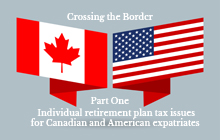A guide to the Canadian tax treatment of domestic, foreign retirement compensation arrangements for high-income earners

Canadian tax lawyer and accountant David J Rotfleisch deconstructs lessons from the recent Tax Court Martin v The King decision involving the CRA and RCAs
Introduction: What is a Retirement Compensation Arrangement?
Retirement planning is a cornerstone of long-term financial security, especially for high-income earners and corporate executives whose pensionable earnings often exceed the thresholds permitted under traditional retirement savings vehicles. One such advanced planning mechanism available in Canada is the Retirement Compensation Arrangement (RCA).
While effective for achieving retirement goals, RCAs also introduce complex tax compliance issues, especially when foreign jurisdictions are involved. This article explores the Canadian legal and tax framework surrounding both domestic and foreign RCAs, drawing on statutory provisions, administrative policies, and key judicial interpretations to outline the opportunities and pitfalls of using these instruments.
A Retirement Compensation Arrangement is defined under subsection 248(1) of the Income Tax Act as a plan or arrangement under which an employer or former employer makes contributions to a custodian to fund retirement benefits for an employee. A custodian refers to the person or organization which holds the contributed funds in trust, with the intent of eventually distributing such funds to the designated beneficiary of an RCA.
The designated beneficiary can be an employee, a former employee, or another beneficiary designated by such employee/former employee. Importantly, these contributions are intended to provide benefits either upon retirement, loss of office or employment, or another similar contingency. Unlike Registered Pension Plans (RPPs) or Registered Retirement Savings Plans (RRSPs), RCAs are not subject to annual contribution limits tied to employment income, making them particularly useful for senior executives or owner-managers of private corporations.
50% of Refundable Withholding Tax under Part XI.3 of the Income Tax Act Payable on Contributions to RCAs in Canada
In a typical RCA structure, the employer contributes funds to a custodian—usually a trust—on behalf of the employee. These funds are then invested and accumulate income. However, to prevent the deferral of taxes on investment income indefinitely, the Income Tax Act imposes a "refundable tax" mechanism to ensure some level of taxation occurs contemporaneously with the deferral of benefit payments.
In other words, contributions to an RCA are taxable under Part XI.3 of the Income Tax Act as a withholding tax, which is equal to 50% of the amount of the contributions. Similarly, any business income or capital gains realized within the RCA trust is also subject to the same withholding tax.
However, as its name implies, the tax is refundable to the custodian upon processing of the required T3-RCA Tax Return, after taking into consideration any distributions made out of the RCA trust and income earned by the trust.
Martin v The King, 2024 TCC 153: Canadian Tax Treatment of RCA Contributions
In a recent Tax Court of Canada decision, Martin v The King, 2024 TCC 153, the court examined the tax implications of contributions made to a Retirement Compensation Agreement (RCA). The case centred on one issue: In computing a non-resident taxpayer's Canadian taxable income under the Income Tax Act, can the taxpayer's RCA contributions from Canadian-sourced employment income be allocated to deduct foreign income?
The Appellants in Martin v The King, Russell Martin and Joshua Donaldson, two professional baseball players, received salary and supplementary compensation from 2015 to 2017 via contribution to the Retirement Compensation Arrangements (RCAs) from their U.S.-based team. Both were non-resident in Canada for income tax purposes. They performed part of their playing duties in Canada and part in the U.S. Their U.S.-based team thereby remitted half of the RCA contributions to the CRA for the Appellants under Part XI.3 of the Income Tax Act, since approximately 50% of the income was estimated to be considered Canadian income.
As a result, the Appellants filed their Canadian income tax returns for the relevant years, and allocated the RCA contributions against their Canadian income. The Canada Revenue Agency (CRA), however, sought to allocate their global income and apply RCA contributions against the Appellants' total income.
The Appellants contended that under section 115(1)(a)(i) of the Income Tax Act, RCA contributions should be deducted solely from Canadian‑source income—i.e., income tied to the percentage of duties performed in Canada—rather than the total global income. In the Appellants' view, applying contributions against foreign‑source income improperly reduced Canadian taxation.
The CRA argued that RCA contributions formed part of the Appellants' total compensation package and, pursuant to the Income Tax Act, should be applied before the global income was apportioned, effectively lowering the Canadian source as well.
The Tax Court ultimately sided with the Appellants. Justice Gagnon held that RCA contributions are indeed part of a taxpayer's remuneration and must be included in total income before allocation. However, Canada has no jurisdiction over a non-resident's income from foreign sources, and, thereby, the RCA contributions cannot offset foreign-source income.
Thus, the Appellants' RCA contributions can only reduce the portion of their income earned in Canada. The Court further criticized the CRA's methodology of applying the contributions globally, ruling that doing so would convert the arrangement into a Salary-Deferral Arrangement (SDA) rather than an RCA. This case has significant implications for retirement compensation agreements (RCAs) as well as cross-border tax planning.
David J Rotfleisch, CPA, JD is the founding tax lawyer of Taxpage.com and Rotfleisch & Samulovitch P.C., a Toronto-based boutique tax law corporate law firm and is a Certified Specialist in Taxation Law who has completed the CICA in-depth tax planning course. He appears regularly in print, radio and TV and blogs extensively.
With over 30 years of experience as both a lawyer and chartered professional accountant, he has helped start-up businesses, cryptocurrency traders, resident and non-resident business owners and corporations with their tax planning, with will and estate planning, voluntary disclosures and tax dispute resolution including tax audit representation and tax litigation. Visit www.Taxpage.com and email David at david@taxpage.com.
Read the original article in full on Tax Law Canada. Author photo courtesy Rotfleisch & Samulovitch P.C.











(0) Comments